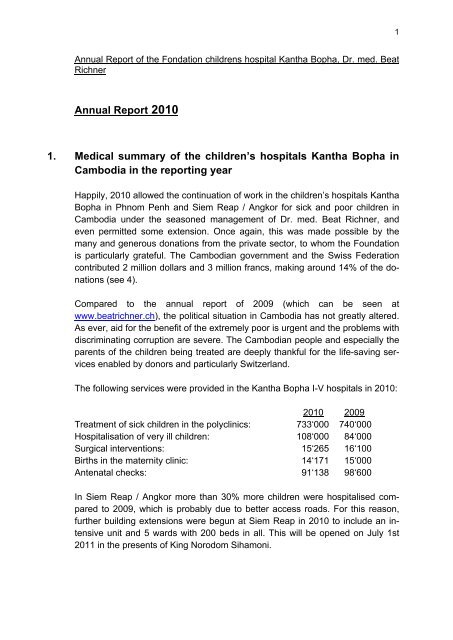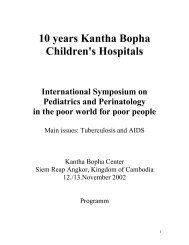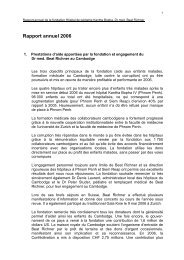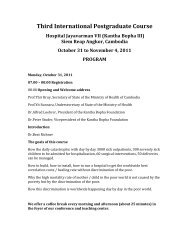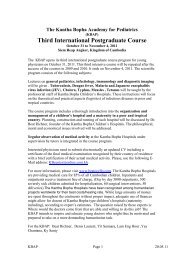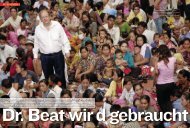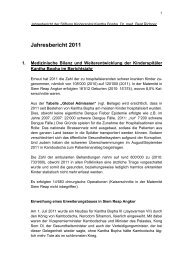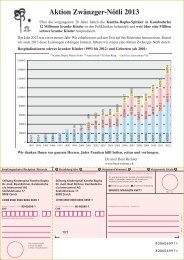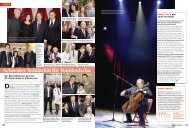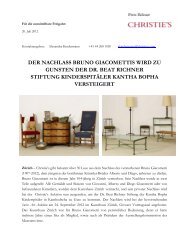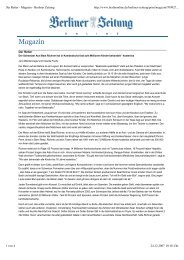Richner_AnnualReport.. - Dr. Beat Richner
Richner_AnnualReport.. - Dr. Beat Richner
Richner_AnnualReport.. - Dr. Beat Richner
You also want an ePaper? Increase the reach of your titles
YUMPU automatically turns print PDFs into web optimized ePapers that Google loves.
1<br />
Annual Report of the Fondation childrens hospital Kantha Bopha, <strong>Dr</strong>. med. <strong>Beat</strong><br />
<strong>Richner</strong><br />
Annual Report 2010<br />
1. Medical summary of the children’s hospitals Kantha Bopha in<br />
Cambodia in the reporting year<br />
Happily, 2010 allowed the continuation of work in the children’s hospitals Kantha<br />
Bopha in Phnom Penh and Siem Reap / Angkor for sick and poor children in<br />
Cambodia under the seasoned management of <strong>Dr</strong>. med. <strong>Beat</strong> <strong>Richner</strong>, and<br />
even permitted some extension. Once again, this was made possible by the<br />
many and generous donations from the private sector, to whom the Foundation<br />
is particularly grateful. The Cambodian government and the Swiss Federation<br />
contributed 2 million dollars and 3 million francs, making around 14% of the donations<br />
(see 4).<br />
Compared to the annual report of 2009 (which can be seen at<br />
www.beatrichner.ch), the political situation in Cambodia has not greatly altered.<br />
As ever, aid for the benefit of the extremely poor is urgent and the problems with<br />
discriminating corruption are severe. The Cambodian people and especially the<br />
parents of the children being treated are deeply thankful for the life-saving services<br />
enabled by donors and particularly Switzerland.<br />
The following services were provided in the Kantha Bopha I-V hospitals in 2010:<br />
2010 2009<br />
Treatment of sick children in the polyclinics: 733‘000 740‘000<br />
Hospitalisation of very ill children: 108‘000 84‘000<br />
Surgical interventions: 15‘265 16‘100<br />
Births in the maternity clinic: 14‘171 15‘000<br />
Antenatal checks: 91‘138 98‘600<br />
In Siem Reap / Angkor more than 30% more children were hospitalised compared<br />
to 2009, which is probably due to better access roads. For this reason,<br />
further building extensions were begun at Siem Reap in 2010 to include an intensive<br />
unit and 5 wards with 200 beds in all. This will be opened on July 1st<br />
2011 in the presents of King Norodom Sihamoni.
2<br />
The slight decrease in polyclinic consultations stems from the improved filtering<br />
process by medical staff at the entrances to the hospitals.<br />
On average, about 300 seriously sick children are hospitalised daily, of whom<br />
110 need to go through the intensive unit. The rate of mortality in the hospitals<br />
was only 0,5% in 2010. The most common illnesses and problems are still tuberculosis,<br />
Dengue fever, malaria and other infections.<br />
Thanks to the MRI / MRS, tuberculosis in children can be diagnosed more gently<br />
and radiation exposure avoided in all organs. Together with Prof. David<br />
Nadal and <strong>Dr</strong>. Ianina Scheer from the Zurich children’s hospital, Cambodian<br />
doctors (trained in the Kantha Bopha hospitals) have published a first scientific<br />
paper about diagnostic progress in tuberculosis in the European Journal of Pediatrics.<br />
Now an extensive study on encephalitis is being carried out together<br />
with the Institut Pasteur.<br />
One particular challenge in the reporting year was the big cholera epidemic. The<br />
first case in Cambodia was diagnosed in November 2009 in the Kantha Bopha<br />
hospitals. The government and the WHO had apparently intended to keep the<br />
epidemic secret. <strong>Dr</strong>. <strong>Beat</strong> <strong>Richner</strong>, however, felt it necessary to go public about<br />
this, since around 2600 partly seriously ill young cholera patients needed to be<br />
hospitalised.<br />
The mortality rate statistics were strongly affected by deaths due to congenital<br />
heart disease. For this reason, a cardiac catheter table was set up in 2010.<br />
Working together with the children’s hospital Zurich (<strong>Dr</strong>. Oliver Kretschmar), it<br />
was then possible to carry out a correction on a child with congenital heart disease<br />
with a minimally invasive intervention in March 2011.<br />
2. Operation and significance of the Kantha Bopha I-V hospitals<br />
In 2010, the number of Cambodian staff (from doctors to cleaners) employed<br />
was around 2300 people. This team is able to run the hospitals independently<br />
and faultlessly in all medical questions. <strong>Dr</strong>. <strong>Beat</strong> <strong>Richner</strong> is now the only foreign<br />
doctor who is constantly on the staff of the Kantha Bopha hospitals. His main<br />
tasks at present are mostly in raising money and applying those funds without<br />
corruption in Cambodia. For special tasks and in particularly intensive phases<br />
(courses, introduction of new techniques, epidemics), <strong>Dr</strong>. <strong>Beat</strong> <strong>Richner</strong> can rely<br />
on the practical assistance of the paediatrician and vice-president of the Foundation,<br />
<strong>Dr</strong>. med. Peter Studer, who is prepared to spend 2-3 months each year<br />
on rounds of duty in Cambodia.
3<br />
The Kantha Bopha hospitals are Cambodian university hospitals. Here, 80<br />
Cambodian medical students work and study, while 60 people are in training for<br />
care duties. 50 doctors are officially employed as professors and lecturers for<br />
the medical faculty of Phnom Penh.<br />
In March 2010, the final evaluation took place for the Cambodian candidates for<br />
a specialist medical title in paediatrics together with the medical faculties of Zurich<br />
and Phnom Penh. Professor Felix Sennhauser, ordinarius for paediatrics<br />
and head doctor of the children’s hospital in Zurich, both deans of the medical<br />
faculties of Phnom Penh and the paediatrician <strong>Dr</strong>. Peter Studer, vice-president<br />
of our Foundation, performed as examiners.<br />
2010 brought another 22 lecturers from the children’s hospital in Zurich to give<br />
regular courses in training the Cambodian doctors in-house. Thanks to these<br />
courses, the Cambodians achieved an extremely high level of specialist<br />
knowledge, absolutely on a par with the European niveau.<br />
In November 2010, the second international post-graduate course was carried<br />
out with great success and a good deal of demand. 80 participants were nominated<br />
by the Cambodian health ministry, 20 participants registered by the governments<br />
of other ASEAN states and a further 20 participants came of private<br />
initiative. The aim of these courses is to show how a hospital is built, equipped<br />
and run in order to achieve optimum cost efficiency / rates of recovery.<br />
Knowledge of infectology and immunology are vital for understanding. For this<br />
reason, Professors David Nadal and Reinhard Seger from Zurich led the corresponding<br />
seminars on these special areas. In addition, Cambodian doctors from<br />
the Kantha Bopha hospitals led courses and practical demonstrations of excellent<br />
quality.<br />
3. Foundation Board and Management<br />
At two meetings on January 25 th 2010 and May 11 th 2010, the Foundation board<br />
dealt with statutory business. The continuing successful and blessed help for<br />
the sick children of Cambodia is great motivation for the members of the Board<br />
for their almost completely voluntary commitment. The Board considers the regular<br />
information and appeals initiated by <strong>Dr</strong>. <strong>Beat</strong> <strong>Richner</strong> with adverts in the<br />
daily press to be extremely valuable.<br />
The auditing and remuneration committee met on March 15 th 2010 and examined<br />
the remuneration of the management staff as well as expenses for accounting,<br />
administration of donations and PR work.
4<br />
Once again, the Foundation Board thanks Intercontrol AG for its transparent<br />
book-keeping and the helpful monthly financial checks. We are also grateful for<br />
the professional procedures in managing legacies and bequests.<br />
Auditing was once again carried out by PricewaterhouseCooprs AG, who also<br />
gave us valuable advice concerning controlling.<br />
The Federal Foundation Oversight Committee has again confirmed the faultless<br />
activity of the Foundation.<br />
In January and November 2010, the president and vice-president reported to<br />
the SDC (DEZA) in Bern on the current work being done in the Foundation and<br />
at the hospitals in Cambodia. The Foundation was especially pleased that representatives<br />
of the SDC had been able to view the Cambodian hospitals in person<br />
and were apparently both surprised and convinced of the great achievements<br />
on site.<br />
In 2010, <strong>Dr</strong>. med. <strong>Beat</strong> <strong>Richner</strong>, together with the president, was then received<br />
both amicably and with great interest at visits with Federal Councillor Ms Calmy-<br />
Rey, Federal President Ms Leuthard and the President of the National Assembly,<br />
National Councillor Ms Bruderer. However, none of these federal representatives<br />
were able to confirm the award of larger sums from the Federal Treasury<br />
even though they showed great personal sympathy for the Cambodian hospitals.<br />
This would necessitate the will of the Federal Parliament. Unfortunately, the<br />
present rather fruitless battle of the parties is resulting in even excellent suggestions<br />
from opposing parties not being supported in party politics. In any case,<br />
not even the Foreign Political Committee of the National Assembly could be<br />
moved to increased support of the Kantha Bopha hospitals for party political<br />
reasons. As ever, our Foundation is convinced that the Kantha Bopha hospitals<br />
are an exceedingly efficient project in the best sense of traditional international<br />
humanitarian aid as originated in Switzerland which would deserve more support<br />
by “official” Switzerland, both materially and in future, also personnel resources.<br />
However, the Foundation is extremely pleased that Federal Councillor Ms<br />
Calmy-Rey has nevertheless allotted, on her own authority, an increased annual<br />
sum of 4 million francs for 2011 (20 years of Kantha Bopha).
5<br />
4. Financial Concerns – Donations – Public Relations<br />
4.1 Annual Financial Statement<br />
The annual financial statement for 2010, approved by the Foundation Board on<br />
May 10 th 2011, closed with assets of CHF 19,405,508.07 and a surplus of CHF<br />
2,010,938.35.<br />
As in previous years, the annual financial statement was carried out according<br />
the recommendations standard SWISS GAAP FER 21 and audited in the existing<br />
form by PricewaterhouseCoopers AG as confirmed in their auditing report of<br />
May 10 th 2011.<br />
Attention is to be drawn to two particularities in our rendering of accounts:<br />
- Due to the unstable political situation, the lack of legal security and for<br />
general administrative caution, the investments are debited directly<br />
from the expenditure.<br />
- Since in Cambodian law, the purchase of real estate by a Swiss Foundation<br />
is not permitted, three plots of land are held in trust by <strong>Dr</strong>. Denis<br />
Laurent, member of hospital management and French-Cambodian dual<br />
national. The corresponding papers are available.<br />
Thanks to boundless acceptance of, and great trust in, <strong>Beat</strong> <strong>Richner</strong>’s work,<br />
2010’s income was, for the first time, over CHF 35 million. Compared to the previous<br />
year, this is an increase of CHF 2 million, or 6%. This pleasing result is<br />
particularly connected to a distinct increase in income from bequests.<br />
The contributions made by the Swiss government (CHF 3 million) and the Cambodian<br />
government (CHF 2 million) have remained the same. The subsidies of<br />
the two states cover 14% or CHF 5 million of the donations; that is, 86% of all<br />
income is financed by the private sector (especially from Switzerland).<br />
A total of almost CHF 400 million in donations has been achieved since 1992 up<br />
to the end of 2010.<br />
Investments, which as mentioned are not activated, but debited directly to expenses,<br />
reached around CHF 4.1 million in 2010 (previous year CHF 2.2 million).<br />
A cardiac catheter for the precise diagnosis of congenital heart disease<br />
was purchased in 2010. In addition, another ward was begun in Siem Reap.<br />
This will be opened on July 1 st 2011.
6<br />
The position “infrastructure expenses Switzerland” consists of administrative<br />
expenses such as advertisements, IT, administration of donations, thank you<br />
letters, bookkeeping and auditing costs and has only cost, on average, 8.33% in<br />
the last three years.<br />
This important benchmark is audited annually by PricewaterhouseCoopers AG<br />
and confirmed in a special report.<br />
4.2 Public Relations<br />
In order to finance the operation of hospitals for children in Cambodia, we are<br />
constantly busy acquiring donations. Without additional donations, our net assets<br />
of CHF 18.7 million would only finance operations for about 6 months.<br />
Therefore, we restarted our successful “Zwänzgernötli” appeal in March 2010. In<br />
June 2010, September 2010 and November 2010 three more mailings were<br />
sent out. Thanks to the four mailings, we generated around 50,000 donations<br />
and a total of about CHF 8.5 million.<br />
The Schweizer Illustrierte launched its traditional Christmas appeal in November<br />
2010. Within the framework of a large report from the hospitals, this particular<br />
magazine issue appealed for donations.<br />
In November and December 2010, we had banner ads on the home pages of<br />
Bluewin and the NZZonline as well as in the New York Times and the Economist.<br />
Thanks to the banner appeal, the recognition of the Foundation is increased<br />
both with new and mostly younger members of the public.<br />
With his permanent worries concerning the missing means, <strong>Beat</strong> <strong>Richner</strong> put on<br />
the following performances in Switzerland in 2010:<br />
28. March 2010 Zurich Grossmünster<br />
8. May 2010 Lausanne Kathedrale<br />
9. May 2010 Einsiedeln Klosterkirche<br />
10. May 2010 Bern Berner Münster<br />
29. August 2010 Zurich Grossmünster<br />
31. August 2010 Chur Martinskirche<br />
In Siem Reap, <strong>Beat</strong> <strong>Richner</strong> continued with his weekly information events, accompanying<br />
this with his cello playing. Every Saturday evening, <strong>Beat</strong> <strong>Richner</strong> informs<br />
an international audience in the Kantha Bopha III auditorium about the<br />
latest medical, political and financial aspects of his work there.
7<br />
Thanks to the geographical proximity of the hospital in Siem Reap to the world<br />
famous grave site at Angkor, <strong>Dr</strong>. <strong>Beat</strong> <strong>Richner</strong>’s work is becoming better known<br />
internationally.<br />
However, the most important connection made by <strong>Beat</strong> <strong>Richner</strong> to the public is<br />
still the regular advertisements we publish in the most important daily newspapers.<br />
In 2010, more than 440 text ads were placed in the Swiss daily papers.<br />
They inform the public about current goings-on in Cambodia. They report on affliction<br />
and desperation, on epidemics, corruption but also on medical successes.<br />
Apart from the text ads mentioned, 2010 also saw around 180 smaller ads places,<br />
highlighting <strong>Beat</strong> <strong>Richner</strong>’s concerts.<br />
<strong>Beat</strong> <strong>Richner</strong>s untiring commitment on the acquisition front, as well as all the<br />
mentioned provisions (in addition to his work as the manager of 5 hospitals with<br />
2300 staff!) and the loyalty of our donators has meant that in 2010 we have<br />
again generated donations and sums of supporting monies of over CHF 35 million<br />
(previous year CHF 33 million)!<br />
5. Thanks and Forecast<br />
We wish to give heartfelt thanks in the name of the Foundation Board, but particularly<br />
in the name of the poor, sick children for all the private, heartfelt donations,<br />
large and small. We thank the governments of Cambodia and the Swiss<br />
Federation for their substantial contributions and consider these to be the<br />
recognition for the outstanding service provided by <strong>Dr</strong>. <strong>Beat</strong> <strong>Richner</strong> and as a<br />
sign of trust in our Foundation.<br />
We thank the media for their reports on our work in the children’s hospitals of<br />
Kantha Bopha. <strong>Dr</strong>. <strong>Beat</strong> <strong>Richner</strong> is always happy to show journalists around,<br />
despite his intensive hours of work. We would especially like to thank the<br />
Schweizer Illustrierte for their many years of sympathy and support for <strong>Dr</strong>. <strong>Beat</strong><br />
<strong>Richner</strong>’s work.<br />
Circus Knie has for many years shown itself a loyal host of the Knie Gala every<br />
May in Zurich. Here, hundreds of friends of <strong>Beat</strong> <strong>Richner</strong> meet in a rather familiar<br />
atmosphere which is open for many more friends – hopefully for many a year<br />
to come.
8<br />
The Foundation wishes to carry on <strong>Dr</strong>. <strong>Beat</strong> <strong>Richner</strong>’s work for as long as possible.<br />
Since the Foundation has no financial investments, but uses the money<br />
collected directly for the treatment of the sick children in Cambodia, a so-called<br />
destruction of financial assets cannot take place. The money is used directly,<br />
without corruption and with efficiency, to save children’s lives. It is in the nature<br />
of things that sometime, the day will come when the country of Cambodia will itself<br />
have to take over the whole financial responsibility for the hospitals. Of<br />
course, this is the scenario which is also important to the Foundation.<br />
Finally, we would like to mention a report from the biggest Vietnamese daily paper<br />
“Tuoi Tre” about the Kantha Bopha hospitals. Over a period of 5 days, impressive<br />
reports from the intensive work of the care and medical staff were<br />
shown, working day and night, without corruption. In particular, it was mentioned<br />
that all treatment is free. In this way, Kantha Bopha avoids economic ruin and<br />
protects the smallest existences. The costs in the private sector and the socalled<br />
public hospitals are enormous. For these costs alone, families have to<br />
sell their last commodities. The report finishes with a demand to start a Kantha<br />
Bopha in Vietnam, too…!<br />
_________________________________________


